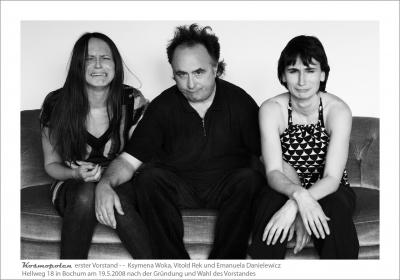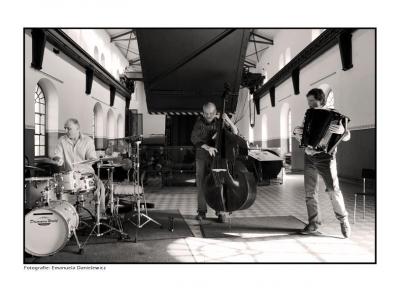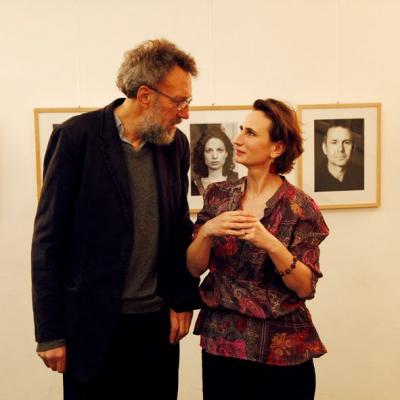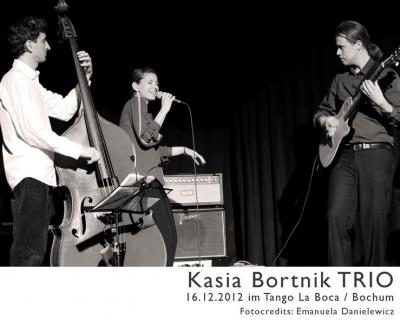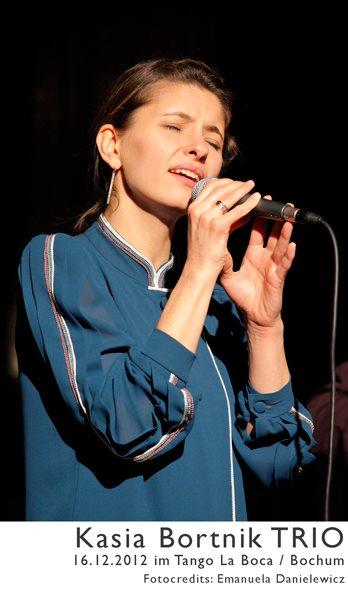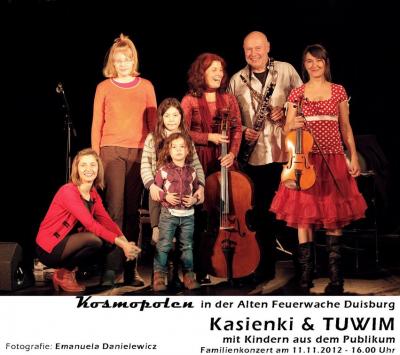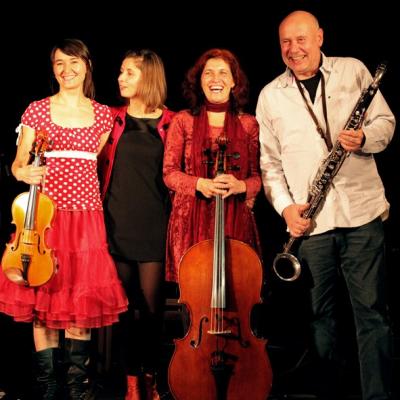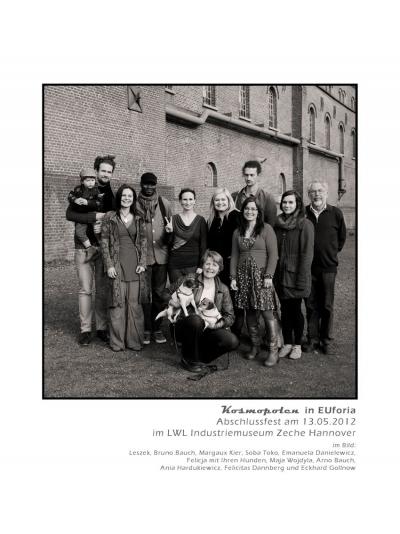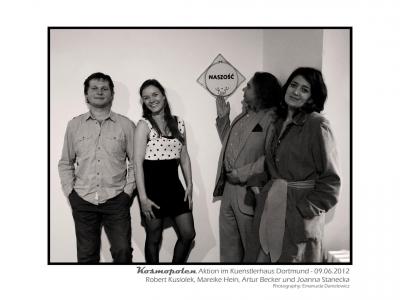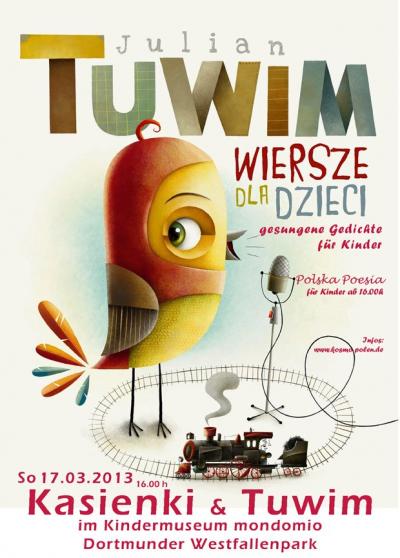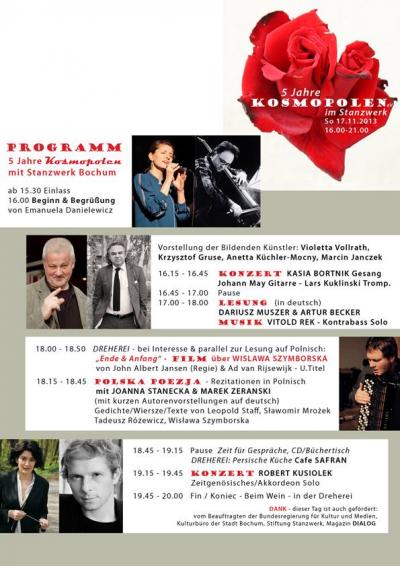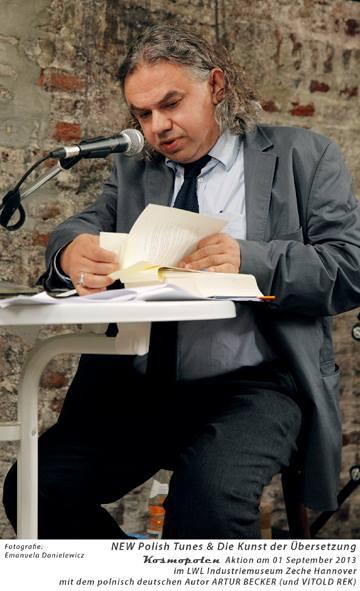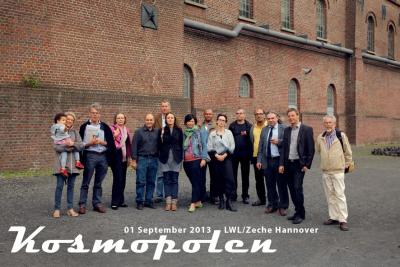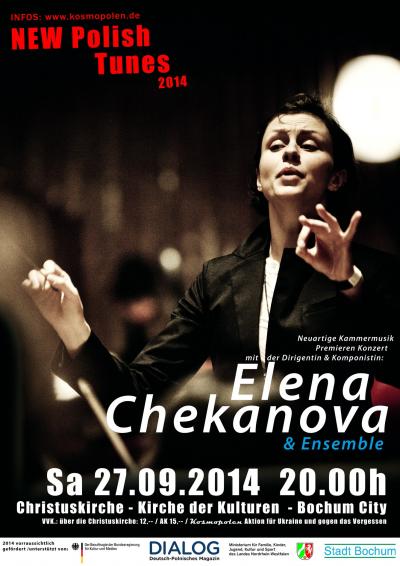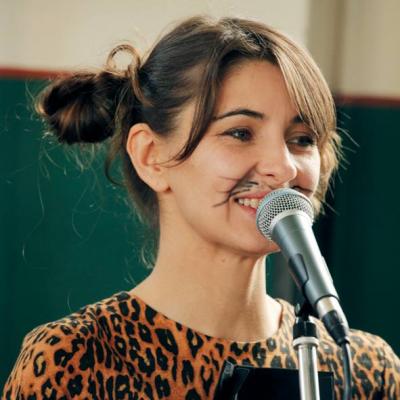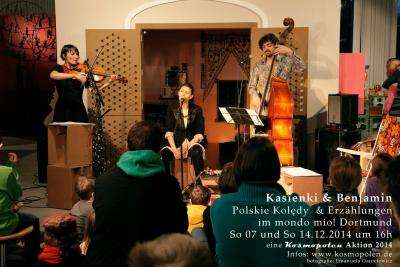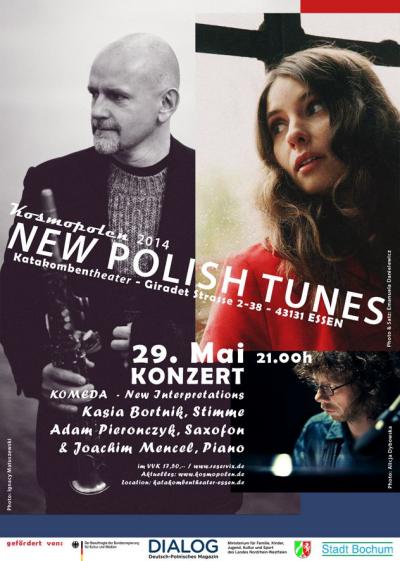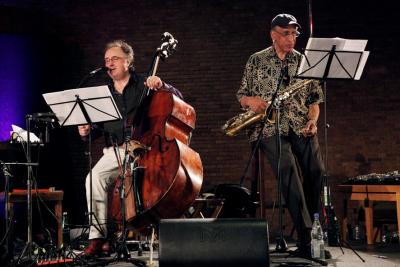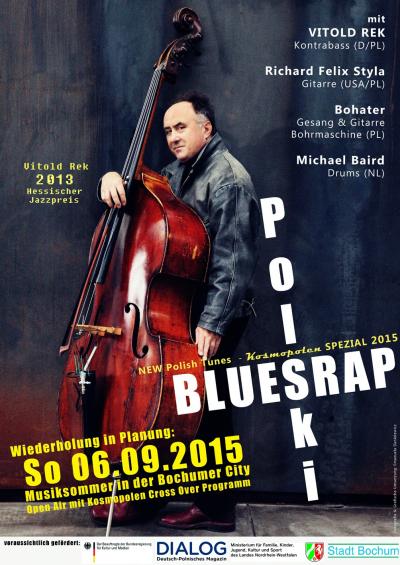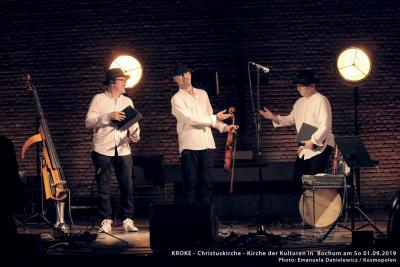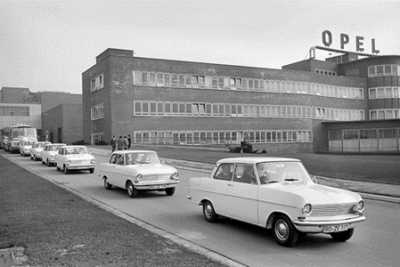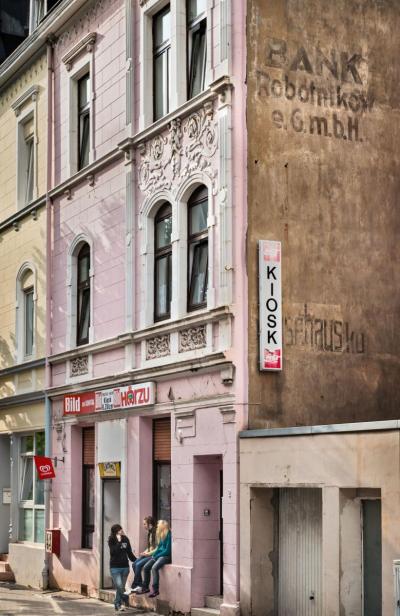Kosmopoles in Bochum: European culture with a Polish focus from the Ruhr area

Since 2008, the word “Kosmopolen”, often in the dashingly curvaceous and self-confident Magneto font, has been seen on posters for concerts, readings and exhibitions from Dortmund to Krefeld. What is the meaning behind it and how does it link such varied activities? Kosmopolen is a “cultural brand” under which very different artists (but not just artists) from the Ruhr area with Polish roots (but not just Polish roots) come together to create culture – but of course, not just that. It is also worth mentioning “Kasienki & Tuwim”, the musical and reading events for children, the music festival “New Polished Tunes”, and countless author’s meetings and readings.
If it sounds somewhat eclectic and just a little confusing then that is all the more reason to take a closer look behind the scenes of Kosmopolen, where many traces of Polish, German and “Ruhr German” culture can be discovered.
The association and the initiative
The fact that Kosmopolen was a registered association (e. V.) was actually just a formality, says Emanuela Danielewicz, who was the founding member and chair until it was disbanded. In effect, she was the heart and the brains behind the initiative. That is why initiative is actually a better word than association, which brings with it the arrogance of fusty ‘clubbiness’, explains the photographer who has an atelier and a gallery at Springerplatz 29a in Bochum. Sometimes she also uses the word collective, but mostly it is a case of “the Kosmopoles” set up this or that, and in this case, she means the individual members.
At times, the association had 35 members, most of them artists. Musicians, such as Vitold Rek, Robert Kusiolek and Benjamin Garcia; authors, such as Artur Becker, actors, such as Joachim Król and Monika Bujinski.
The association was officially dissolved in 2019/2020. Apparently, the ‘clubbiness’ did not go down so well, although the events got bigger and became more popular. It is impossible to imagine the annual city festival “Bochumer Musiksommer” without the Kosmopolen. But the label will continue. It is even a registered trade mark: Kosmopolen®. And that is why there will still be a stage designed by the Kosmopolen at future Bochumer Musiksommer events.
The articles of association contain the standard phrases which the authorities like to read and which are usually included in the articles of cultural associations: The “promotion of art and culture” is a goal. Three other points are more interesting: the members view themselves as “pioneers for the new generation in music, art and literature”. Openness and the exchange of ideas are particularly important to them because “innovation and inspiration always come from outside”. That is why Kosmopolen wanted to “encourage the dialogue between that which was, that which is and that which will be”.[1]
The articles provide for “the promotion of understanding between the German and the Polish people”, but in our conversation Emanuela Danielewicz explained that it is actually about so much more than that. She stressed that the culture of the Ruhr area is an element that brings people together. Many Kosmopoles were born in Germany (like the actor Joachim Król, who was born in Herne), others came to Germany as children, like Danielewicz herself who ended up in Bochum via Berlin. Others came to Germany to study (like the jazz singer Kasia Bortnik) or as grown adults. Others, like the musician Benjamin Garcia, do not have any Polish roots.
The cooperative’s nucleus was in Bochum, the place where Danielewicz, the association’s founder, lived and worked. But not all members were “Ruhris” or people from the Ruhr area. And they took the ‘Kosmopole’ idea to Hanover, Berlin and Cologne. And anyway, Polishness is European, as will be explained later on. Another important issue for Danielewicz is to make the lost Jewish culture invisible. This is European too and it also connects the German and Polish cultures.
[1] Kosmopolen e. V., Satzung, in: Kosmopolen.org, Stand: 04.11.2017, http://kosmopolen.org/verein-organisation/.
Embracing industrial culture with a festival
In the year after it was founded, the association introduced itself with a bang. The Kosmopolen Festival in February and March 2009 clearly revealed the full bandwidth of the association. In the Stanzwerk in Bochum-Sundern, Ksymena Woka, who was born in Bochum, and the performance writer Wojciech Stamm read from their works. Music was provided by the Polish jazz double bass player Vitold Rek and his band EastWestWind, and Disguise, Katrin Mickiewicz’s band from Essen, combined Polish and Bulgarian elements in their own compositions. The programme was rounded off with paintings and photographs from Krzysztof Gruse on the walls. Just a short time later, the Stanzwerk became part of the Industrial Heritage Trail. Coincidence?
Many other events were to follow which showcased the creative potential of established and emerging “not-just-Poles”. In interviews, Emanuela Danielewicz always stresses that she recognises talent and wants to encourage it whenever she can. Many of the initiatives involve concepts that can be staged again and again with a permanent or changing ensemble. One of these is “Remember” – a concert/reading evening to remember the liberation of Auschwitz concentration camp. In 2011, the band Kroke played at this occasion and Joanna Stanecka and Frank Wickermann gave readings in the Bochum Christuskirche.
The cooperative had a special connection with the Westphalian State Museum of Industrial Culture Zeche Hannover in the Bochum district of Hordel on the border with Herne-Eickel. In 2011, “Ein Mehr sehen”, a multidisciplinary festival, was held there as part of the Poland-NRW-Year 2011/2012. The exhibitions at the museum are mainly devoted to the topic of immigration. Kosmopolen also embraced this subject matter, and again there were music and readings involving many artists. “Ein Mehr sehen”, the title of this weekend of initiatives, refers to the fact that, in contrast to many other migrant groups, Poles in Germany are always somewhat inconspicuous. But for Kosmopolen, it was about making all these influences visible. At the end, Dietmar Osses, historian and head of the Zeche Hannover Museum, gave a talk entitled “From Ruhr Poles to Cosmopoles” to honour the activities within the initiative. In his talk, he demonstrated the transition that there has been in external perceptions: Yesterday, Poles were the invisible grafters, today they can be seen and heard on all platforms.
The fact that the initiative for all these events did not come from the association itself, but was suggested by sources outside the association who then extended the invitation, is testimony to the good network of the association’s members. Networking is also connecting, it is visibility. At the same time, this situation also shows just how popular the Kosmopolen were and still are. The Kasienki – Katrin Mickiewicz, Kasia Bortnik and Benjamin Garcia – practically see the children in the audience at the Christmas concerts “Kasienki & Kolędy” growing up because they come to the concerts each year.
What is a Kosmopole?
The question of what a Kosmopole actually is, is not so easy to answer. There will be at least as many definitions as there were members in the association, and probably a few more besides. Hidden behind this term is more than just a type of person, it is a concept, a state of mind. The term was coined by the author and essayist Andrzej Bobkowski (1913–2013), perhaps as early as 1960. In that year, he published the Biography of a great Cosmopole (“Biografia wielkiego Kosmopolaka”) in “Kultura”, the Polish exile magazine in Paris. He was talking about Joseph Conrad, who was born a Pole in the Russian Empire but ultimately, living in Great Britain and travelling through Africa and South-East Asia, became one of the most important English language authors of the 19th century. (His “Heart of darkness” was made into the film “Apocalypse Now”.)
The word Kosmopole is made up of kosmopolita and Polak, i.e. cosmopolitan and Pole. But Bobkowski does not just intend it to mean a travelling, worldly person of Polish heritage. Instead, he seems to have found another word for Poles in exile: Joseph Conrad “was, of course, not an Englishman. But he was not quite Polish either. He was a perfect example of a ‘Kosmopole’ and should be seen as such a perfect example.”[2] And indeed it is something that Poles speak about shamefacedly, even though there were so many Kosmopoles, including a few prominent ones. In this context, Bobkowski mentions Frédéric Chopin, for example.[3]
According to Bobkowski, the Kosmopole is a Pole in exile who is no longer completely Polish but is not a true Englishman, American, German, “Ruhri” etc. either. But because of the different associations that he arouses, and the diversity of the Polonia – the Polish community abroad – the term established a precedent. Kosmopoles can be both. They can be people who combine conflicting elements within themselves. They can be both and even more. In 2016, Artur Becker published his volume of essays entitled “Kosmopolen: Auf der Suche nach einem europäischen Zuhause“ [“Cosmopoles: On the lookout for a European home”] For him, Kosmopolen is “a space for relaxation, inspiration and above all a space for retreat”[4]. After the essay was published, Becker also became a member of the Bochumer Initiative which was known to him prior to this.
The Initiative understood the indefinable, multifaceted nature of the term. On the one hand, they play down the meaning of the name: “A name is, however, just, and in the best sense, an opener, a key term. It quickly arouses interest and should not be taken too seriously, which is our intention. What Kosmopolen is, was, or will be depends as it always has on our ideas and on the way in which they are actually implemented, in which goals are set. But it depends on the content. “[5] Then again, this explanation is – paradoxically – at the end of a long derivation of the name on one of the subpages on their website.
The fact that the association chose this name, can be attributed to a conversation between Emanuela Danielewicz and the actor Joachim Król. Danielewicz recalls that he suggested the name when he sat for a portrait with her one day. “We’ll take the name, if you’ll be part of it”, she had said. When Król said, “Of course”, it was a done deal – even when the actor, how has Silesian roots, was later quoted in an interview with the Tagesspiegel as having said: “Just don’t tell anyone where you come from.”[6]
[2] Andrzej Bobkowski, Biografia wielkiego Kosmopolaka, in: Kultura (1960), 19–32, hier 32.
[3] Ibid.
[4] Kosmopolen e. V., Geschichte des Namens: Kosmopolak, zu deutsch Kosmopole, in: Kosmopolen.org, Stand: 01.03.2021, http://kosmopolen.org/kosmopolen-bochum/geschichte-des-namens/.
[5] Ibid.
[6] Markus Ehrenberg, Erzähl’ bloß nicht, wo du herkommst, in: Tagesspiegel.de, Stand: 09.05.2011, https://www.tagesspiegel.de/gesellschaft/medien/interview-erzaehl-bloss-nicht-wo-du-herkommst/4146730.html.
Every Kosmopole is different – and sometimes not even a Pole
Perhaps it is fitting that everyone wants to understand the name in the way they choose. Because each member in their own way identifies as German, as Polish, as both or as neither. Each member considers their role, their calling – their art – to be influenced in a very individual way by the question of identity.
In the discussion with Porta Polonica, the jazz singer Kasia Bortnik granted us an insight into how identity and art are interwoven for her. In 1997, she left her parents and siblings to study in the neighbouring country and says without hesitation: “Of course I am a Pole.” But then she takes stock and adds: “Germany has become my home.” How will she define herself when her parents are no longer there? One of her songs has a German name “Heimat” [“Homeland”], but the text is in Polish. In the verse Kasia Bortnik sings: „Chcę być tam gdzie soczyste gaje, słowa ojczyste dumne jak żurawie, czyny szlachetne i serca otwarte na dobro i prawdę.” (“I want to be where the juicy groves are, where the words of the homeland are as proud as the cranes, where the deeds are noble and the hearts are open to goodness and truth.”)
Some of her music has been inspired by images of her childhood in Silesia. She recorded “Kiej na mojej jo mateczce”, a Silesian folk song, for her 2019 album “The Moon Is Just a Fake”. Born in Breslau, she prefers to write in Polish, the language of her homeland as she herself says, but also in English, the language of her heart. She still has not dared to write in German. She only recently discovered the poems by Hilde Domin, which directly conjure up melodies in her head. These poems are currently being set to music.
Emanuela Danielewicz’s creativity does not let itself be tied down by language. Her profession, photography, has different schools and different styles, as does every art form. American photography is different to European, explains Emanuela Danielewicz. But to say that she does Polish photography – she sees that as a “criticism” of her creativity. She creates portraits, there are no nationalities in that.
At most, her art is European. “What is Polish is European”, says Emanuela Danielewicz. During our talk, she always refers back to the fact that nationalist trends, particularly in Poland, but also elsewhere, have intensified. As a personal goal and by using her creativity, she wants to break down nationalities, or at least nationalisms. “Portrait photography is a dialogue” and dialogue ultimately is the bridge between two so-called fronts. For this reason, she does not like terms, such as “Germanpoles” and “German-Polish cultural event” either. These terms do not just contain one nationalism, they contain two at the same time!
Kosmopolen should be the path out of nationality, not into it, explains the association’s founder.
Kosmopolen is dead, long live Kosmopolen
The association was founded on 19 May 2008 in Bochumer Hellweg (the little street in the town centre, not the DIY store). On this day, there were 11 artists in Emanuela Danielewicz’s old apartment at house number 18. The apartment with the green sofa (“the green salon”) had been famous in the Ruhrgebiet art scene for some time for anything from cosy evening get-togethers, to philosophical nights, to wild dance parties, recalls the photographer and raves about the wonderful outlook across Bochum’s rooftops.
“Kosmopolen brought people together”, she says One example of this is the musical duo Kasienki made up of Kasia Bortnik and Katrin Mickiewicz, both of whom studied at Folkwang University, but only got to know each other through the cooperative. Kasia Bortnik was an official member of Kosmopolen e. V., but for her it is more than a membership. She starts by using this term, but then corrects herself by using the term “commitment” and concludes that it is “friendship” that she most connects with the Kosmopolen.
Today, the singer Kasia Bortnik lives in Cologne, the viola player Katrin Mickiewicz in Berlin. Whilst Kasia Bortnik was friends with many Kosmopoles, the distance to Bochum was a bit too far for a spontaneous catch-up for coffee or to talk about the world and his wife. Exchanging views with other Polish artists, let alone getting anything off the ground, is difficult in Cologne too; but the Kosmopoles seemed to make it work.
Concerts, readings, memorial services or even festivals – all these event require a lot of work and a lot of helping hands. Technology, advertising, hospitality, looking after guests, admissions – and, of course, the concept and the programme itself. Emanuela Danielewicz was responsible for many events. She is a doer, an organisational talent. But she held out the hope of taking the Kosmopole idea out of the Ruhr area without the demands of a functioning cultural operation. At the last members’ general meeting on 27 January 2019, it was resolved to dissolve the association.[7]
Emanuela Danielewicz does not appear to be too sad about this. She had never expected the association to exist for more than two or three years. And apart from which, the “Kosmopolen” brand still exists. The art concepts were too successful, so many evenings too memorable, the message too effective. There will still be a Kosmopolen stage at the “Bochumer Musiksommer” in the future. “Kasienki & Kolędy” or “Kasienki & Benjamin” will continue to delight children of all nationalities with Christmas songs and stories. The music festival “New Polished Tunes”, like so many other events, had to be cancelled in 2020 due to the coronavirus. The former members of the association can continue to do their own thing under this label. All this proves that the association's structure was just a formality. Culture and commitment are not dependent upon an entry in the register of associations.
Danielewicz is now on the board of the Deutsch-Polnischen Gesellschaft Bochum NRW e. V. which was founded on 23 September 2020. This association also aims to promote Polish aspects within NRW culture, but it is a bit more institutional. Big names from politics and science are members, including Jürgen Mittag, political scientist at the Cologne University and Chair of the Europa-Union in Bochum, and Thorsten Klute, the Polonia representative for NRW. So this kind of association is not so useless after all. “That’s how it works in Germany”, says Emanuela Danielewicz.
Marek Firlej, march 2021
[7] Kosmopolen e. V., News über die laufende Liquidation und über die Zukunft der „freien“ Kosmopolen, in: Kosmopolen.org. Stand: 27.01.2019, http://kosmopolen.org/.
Introducing a few Kosmopoles and their friends
Emanuela Danielewicz
Photographer, manager of projects and culture
www.danielewicz.de
Vitold Rek
Musician
www.porta-polonica.de/de/atlas-der-erinnerungsorte/vitold-rek
Artur Becker
Author and publicist
www.arturbecker.de
Robert Kusiolek
Musician
www.robertkusiolek.com
Elena Chekanova (also Elena Chekanowa)
Musician
www.elenachekanova.com
Kasia Bortnik
Musician
kasiabortnik.com
Katrin Mickiewicz
Musician
www.katrinmickiewicz.com
Benjamin Garcia
Musician
www.benjamin-garcia.de
Johann May
Musician
johannmay.de
jinjim.com
Iwona Gadzala
Musician with the Bochum Symphony Orchestra
Monika Bujinski
Actor
www.monikabujinski.de
Patrycja Ziolkowska
Actor
Joachim Król
Actor
https://joachimkrol.de/
Diederik Sutorius
Culture manager
Filippa Gojo (also Filippa Goyo)
Musician
Dariusz Muszer
Author
dariusz-muszer.de
Antoine Duikers
Musician
antoineduijkers.com
Bohater
Hiphop artist and musician
https://www.facebook.com/bohater
Kroke
Band
kroke.pl
Adam Pieronczyk
Musician
adampieronczyk.net
Wacław Zimpel
Musician
waclawzimpel.pl
Ulrike Draesner
Author
www.draesner.de
Basil Kerski
Culture manager and publicist
Sources
Bobkowski, Andrzej, Biografia wielkiego Kosmopolaka, in: Kultura (1960), 19–32.
Ehrenberg, Markus, Erzähl’ bloß nicht, wo du herkommst, in: Tagesspiegel.de, as at: 9/5/2011, https://www.tagesspiegel.de/gesellschaft/medien/interview-erzaehl-bloss-nicht-wo-du-herkommst/4146730.html.
Kosmopolen e. V., Geschichte des Namens: Kosmopolak, zu deutsch Kosmopole, in: Kosmopolen, as at: 1/3/2021, http://kosmopolen.org/kosmopolen-bochum/geschichte-des-namens/.
—, News über die laufende Liquidation und über die Zukunft der „freien“ Kosmopolen, in: , as at: 27/1/2019, http://kosmopolen.org/.
—, Articles of Association, in: , as at: 4/11/2017, http://kosmopolen.org/verein-organisation/.
